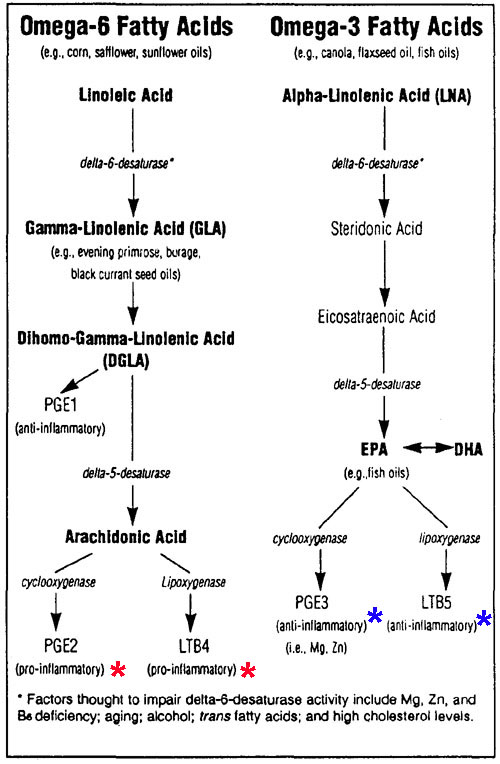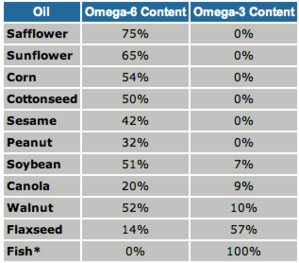 Vegetable oils have become a major negative impact on human health in modern times because so many of them are inflammatory. They are simply toxic and must be avoided for achieving optimal health. Here is why.
Vegetable oils have become a major negative impact on human health in modern times because so many of them are inflammatory. They are simply toxic and must be avoided for achieving optimal health. Here is why.
The Wrong Oils
Human biology requires a certain amount of fatty acids of the right type, in the right proportions, for basic metabolic health. The right types, which are known as omega-6 and omega-3 fatty acids, are deemed essential because we have to get them from our diet.
Unfortunately, these essential fatty acids create health problems when we consume an imbalance of them. Before explaining what this means, bear with me by taking a look at the following chart. (If biochemistry isn’t your strong suit, then skip down to the text below. Biochemistry really is fun, though, when you give it a chance!)

In simple words, we need both of these metabolic pathways. The inflammatory response on the left side is important for repairing acute damage. The anti-inflammatory response on the right side is important for reducing unnecessary inflammation.
To give you an idea of how out of balance we are, the over-response on the left side is where a multibillion dollar pharmaceutical industry resides. This is where Celebrex, Vioxx (before it was banned), and many other prescription pain medications work. The most popular over-the-counter pain drugs, the common NSAIDS, work here, too.
The main point is that you can cause inflammation and its resultant pain by consuming too much of the omega-6 fatty acids and not enough of the omega-3 fatty acids.
Note that the main source of inflammatory omega-6 fatty acids is vegetable oils and that the main source of anti-inflammatory omega-3 fatty acids is fish oils.
In fact, the general distribution of omega-6 to omega-3 is easily visualized in this table:

Upon first glance, this chart seems to show that certain vegetable oils are good sources of omega-3 oils. However, the particular oils from these sources are mainly of one type, called alpha-linolenic acid (see the top of the chart above). Unfortunately, the conversion of alpha-linolenic acid to the real key oils, such as DHA, is highly inefficient. Maybe only 1 percent of LNA gets converted into DHA. Fish oil is still the best choice for omega-3 oils.
What Should the Balance Be?
Here is what we know from human studies so far: the ratio of omega-6 to omega-3 oils should be between 4:1 and 1:1 for optimum health. The actual average is closer to 20:1 in modern times. This imbalanced ratio is due to the over-consumption of vegetable oils.
The good news is that all you have to do for regaining a balanced ratio of omega-6 to omega-3 oils is cut way down on dietary vegetable oils and boost your intake of fish oils.
Special Case of Arachidonic Acid
Notice that one of the omega-6 oils on the left side of the chart above is arachidonic acid. It is not an essential oil, since we can make it from other omega-6 fatty acids. However, if you are planning to cut down on vegetable oils, which is the main recommendation here, then you will still benefit from plenty of dietary arachidonic acid. The main sources of this key oil are meat, eggs, and dairy.
Arachidonic acid is super important for brain health, muscle growth and repair, and liver metabolism. You certainly should get plenty of it in your diet. Always keep in mind, though, that you must keep up your intake of omega-3 (fish) oils to keep the inflammatory properties of arachidonic acid from getting out of hand.
Bonus Warning About Canola Oil
In addition to the concern of too much dietary omega-6 oil, the way that vegetable oils are processed should give you pause before you even consider putting them into your mouth. Here is a promotional video on canola oil processing that shows you what I mean. I don’t know why it is ‘promotional’ – after seeing what they do to get this stuff on the shelf (and it isn’t the only vegetable oil that is processed like this), I am disgusted by the idea of ever consuming this crap.
Consider yourself forewarned.
All the best in natural health,
![]()
Statements on this page have not been evaluated by the Food and Drug Administration. This product is not intended to diagnose, treat, cure, or prevent any disease.
Are there any data from studies showing inflammation from vegetable oils? Searched pubmed but having a hard time finding conclusive data. Thanks in advance.
Hi, John:
Yes, there are some good articles out there. Start with these:
https://pubmed.ncbi.nlm.nih.gov/12442909/
https://pubmed.ncbi.nlm.nih.gov/18408140/
They address the O6/O3 ratios and their health effects. The main source of imbalance is vegetable oils.
Cheers,
Dennis